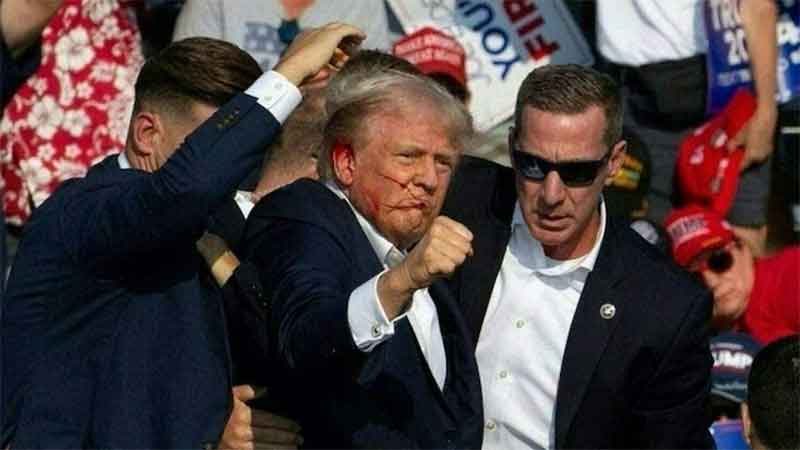
By David A. Graham
Former President Donald Trump was rushed offstage at a rally in Pennsylvania tonight after a shooting.
Trump posted on his Truth Social site that he was struck in the ear by a bullet, and the Secret Service said in a statement that a shooter had fired several times from an elevated position toward Trump. The former president raised a fist to the crowd as he was ushered away. His campaign said in a statement that he was “fine and is being checked out at a local medical facility.” The rally ended abruptly, and the venue was evacuated. The Secret Service said that the alleged shooter and an audience member were killed, and that two other people were critically injured.
President Joe Biden said in a statement that he had been briefed on the incident. “I’m grateful to hear that he’s safe and doing well. I’m praying for him and his family and for all those who were at the rally, as we await further information,” Biden said. “There’s no place for this kind of violence in America. We must unite as one nation to condemn it.”
The incident seems likely to escalate what is already an extremely tense election cycle. Trump is leading polls with a campaign centered on retribution for his political adversaries; he has promised to be a dictator on his first day back in the Oval Office, though only the first day. Meanwhile, Biden’s status as the Democratic Party candidate is in question.
From the April 2023 issue: The new anarchy
If this was an assassination attempt on Trump, that would be rare but not unheard-of. President Ronald Reagan survived a shooting in 1981. Former President Theodore Roosevelt was injured by a gunshot during his own attempt to return to the White House in 1912. Senator Robert F. Kennedy was killed during his 1968 campaign for president. Presidents Abraham Lincoln, James Garfield, William McKinley, and John F. Kennedy were all fatally shot while in office.
Trump’s campaign rallies have frequently witnessed violence or the threat of it, though not in the past directed at the candidate. Protesters demonstrating against Trump have been assaulted, and Trump himself has encouraged attacks against them.
The most serious incident of political violence in recent American history occurred on January 6, 2021, following a Trump rally in Washington, D.C., when a crowd incited by Trump attacked and sacked the U.S. Capitol, bloodying police officers and disrupting Congress. Some protesters erected a gallows, carried zip ties, and said they were hunting for then–Speaker of the House Nancy Pelosi and Vice President Mike Pence.
The incidents fit into a broad pattern in notable incidents of political violence in the United States. In June 2017, a domestic terrorist opened fire on members of Congress practicing for an annual baseball game, gravely wounding Steve Scalise, a member of House Republican leadership. Two months later, neo-Nazis rampaged through the streets of Charlottesville, Virginia, and one woman was killed. In 2018, a man mailed pipe bombs to several perceived opponents of Trump. Several men were convicted in a 2020 plot to kidnap Michigan Governor Gretchen Whitmer, a Democrat. In 2022, a man was arrested for plotting to assassinate Supreme Court Justice Brett Kavanaugh. Another man was killed after attacking an FBI office in Ohio, and a man who attacked Pelosi’s husband was recently convicted.
Many of these incidents have an apparent connection to political events; others, including the 2022 killing of a retired judge in Wisconsin, appear to reflect interpersonal animosity, and some perpetrators have shown signs of mental disturbance. The number of Americans who say that political violence is sometimes justified has also risen.
My colleague Adrienne LaFrance reported on the trend in April 2023. “In recent years, Americans have contemplated a worst-case scenario, in which the country’s extreme and widening divisions lead to a second Civil War,” she noted. “But what the country is experiencing now—and will likely continue to experience for a generation or more—is something different. The form of extremism we face is a new phase of domestic terror, one characterized by radicalized individuals with shape-shifting ideologies willing to kill their political enemies. Unchecked, it promises an era of slow-motion anarchy.”
What happens in the aftermath of the incident today will depend a great deal on what details emerge about this shooting and how Trump recovers. But it will also depend on the way the nation’s leaders react. Many national politicians immediately responded with condemnations of violence and prayers for Trump. Political scientists have found that even voters who hold antidemocratic attitudes are influenced strongly by top political figures. In this fragile moment, the nation desperately needs prudent and wise leadership.
David A. Graham is a staff writer at The Atlantic.
source : theatlantic
